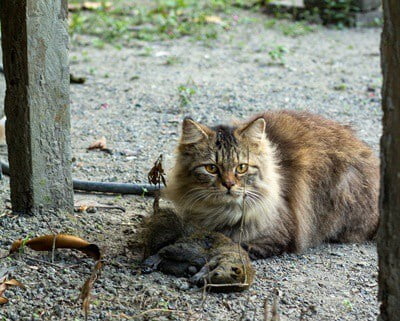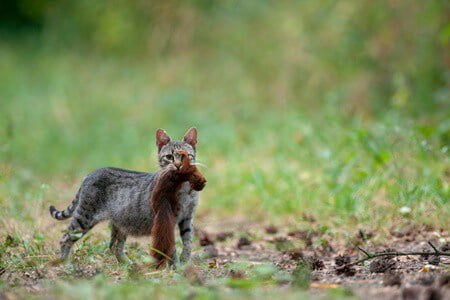Squirrels aren’t considered a cat’s enemy, but cats are instinctual predators. If presented with the opportunity, cats may choose to hunt a squirrel for food or entertainment. While birds, mice, and other small mammals are preyed upon more often, it’s not unheard of for a cat to kill a squirrel.
Cats prefer to prey on smaller mammals than squirrels as they are easier to catch and kill. However, cats can’t resist the thrill of the chase and may go after a squirrel if it attempts to run away. Feral cats are more likely to kill squirrels for food, while domesticated cats are likely to kill because their predatory instincts have been activated.
Squirrels can pass on fleas, mange, and other diseases, so cats with a strong hunting instinct will need to be checked for health problems. Squirrels are larger than the mammals and birds that cats are most likely to pursue.
Cats vs. Squirrels
Feral and domestic cats have completely different personalities because they live in different ways. Domestic cats are looked after by human owners and usually spend their life indoors. Feral cats tend to live in colonies and hunt for food to stay alive. This has a significant bearing on whether either will kill a squirrel.
Feral Cats Killing Squirrels
Feral cats are more likely to kill squirrels for food than domestic cats. This is because they need to catch prey for sustenance. Unlike domestic cats that have human owners to provide their food for them, feral cats rely on their hunting and scavenging skills to stay alive.
However, a study in Wildlife Research found that while barbary ground squirrels are preyed upon by feral cats, it’s less often than other mammals, like rabbits and mice. Squirrels are fast animals and can hide away up trees. Hungry feral cats are more likely to hunt slower-moving mammals that are easier to catch and kill.

Domestic Cats Killing Squirrels
According to Nature, it is estimated that free-ranging domestic cats kill between 6.3-22.3 billion mammals, including squirrels, annually in the U.S. Free-ranging cats cause substantially greater wildlife mortality than previously thought and are a real danger to mammals and birds.
Domestic cats are more likely to hunt squirrels for fun. They already have food provided to them by their owners, so it’s unusual for them to kill a squirrel to eat unless they enjoy the taste.
Only accomplished hunters will be able to actively catch a squirrel. Most squirrels that are caught will be babies, young adults, or squirrels that have sustained an injury. A healthy adult squirrel will rarely find itself as a cat’s hunting trophy unless the cat is an expert hunter.
Do Cats Attack Squirrels?
Whether a cat is likely to attack a squirrel or not usually comes down to the animal’s personality. Many cats are happy to simply go for a roam at night. Others will go out to hunt. Predator cats will usually present their trophy to their human owners, showing it off with pride.
With each capture, a cat’s confidence will grow. While it’s rare that a cat will chase after a squirrel, a cat that’s feeling brave might try its luck. More often than not, the squirrel will get away due to its speed and size.
Do Cats Eat Squirrels?
Most domestic cats hunt for sport, not food. If a cat manages to catch and kill a squirrel, it will either leave the dead animal where it died, present it to its owners or eat the squirrel. Domestic cats that enjoy the taste of mammals or who are already fed a raw diet are more likely to consume their prey.
Feral cats are more likely to hunt for food, but they primarily scavenge and eat scraps and refuse. They will eat whatever is easiest to find. When they do hunt, cat studies show that they will catch whatever prey animal is most common in their area at the time of year. This means that in woody urban areas, squirrels are more likely to become a cat’s primary prey, alongside mice and birds.
My Cat Just Killed a Squirrel
If your cat is a proficient hunter, it may have landed a squirrel as its kill. This is a real achievement for your cat. However, it’s a good idea to check your cat over once it has calmed down from its hunting activities.
Squirrels have chiseled teeth and sharp claws that can easily do damage if they fight back. Check through your cat’s fur to the skin to make sure it’s sustained no significant injury. Look for any scratches, bite marks or bald patches of fur.
A cat bringing its prey into the house isn’t particularly pleasant. Your cat is acting out its natural role as mother and teacher – you are being taught how to hunt. This is a highly evolved survival technique and an ingrained part of a cat’s instincts. Unfortunately, short of keeping your cat locked in the house, there’s not much you can do to stop a cat’s hunting instincts.
You will want to dispose of the squirrel hygienically and safely, though. To do so, follow these steps:
- Lock your cat outside of the room. You’ll be using chemicals to clean, and you won’t want your cat going near these.
- If you have them, put on some rubber gloves before you pick up the dead squirrel. If not, use a piece of toilet paper of kitchen roll so you’re not touching the animal directly.
- Place the squirrel in a plastic bag and fasten it tightly so no air can get out. Place it in the trash can.
- If the squirrel came into contact with a hard surface like wood or tile, disinfect the area using 1-part bleach to 10-parts water. Give it a thorough scrub.
- If the squirrel came into contact with a carpet or a fabric surface like a rug or upholstery, clean it with specialized shampoo or steam clean the area. Any bedding or clothing that came into contact with the dead squirrel should be washed.
Cat Chasing Squirrel
Cats are natural predators that will chase anything that runs away. Squirrels also have big, bushy tails that make them an enticing target. Before a cat will pounce on a squirrel, it will silently nestle itself into the ground so that it can’t be seen by its prey. The cat will make itself go as low as it possibly can.
It will then press its ears back and stare silently at its prey, watching and judging its every move. When it feels that it’s the right time to pounce, the cat will start to wiggle its rear end and pounce forward, propelling itself as fast as it can. At this point, the chase will be on. If the squirrel manages to get away, the cat will likely move onto another victim. The chase will be fast and over quickly, regardless of whether the cat is successful or not.
If you’re able to witness the beginnings of the chase, you can disrupt the process by shooing the squirrel away or giving up your cat’s position. Your cat will likely be incredibly focused on its prey and mad at you for a while, but it will eventually get over it as it moves onto something else to do.
It might seem obvious that a cat will have the upper hand against a squirrel, but this isn’t entirely true. Squirrels are fast and ferocious once threatened. They also have sharp claws and teeth that can cause damage.
Catching Squirrels
Squirrels are master climbers and can scale trees and other vertical platforms with ease. Cats will only go as high as it can safely before giving up on the chase. Squirrels are also able to go inside small hollows, meaning they can evade cats quite easily. A cat that climbs too high will only get stuck, and their instincts generally know better than to do that.
Hunting Squirrels
When it comes to the hunt, cats will be more successful on the ground. Babies that have fallen out of their nest or injured squirrels will be easier to catch and kill. And when a cat finally gets hold of a squirrel, a cat will puncture a squirrel’s neck and subdue its prey fairly quickly.
How to Stop Cats Killing Squirrels
While you can’t alter a cat’s hunting instincts, they will usually diminish as the cat gets older. If you can’t wait that long and want to stop your cat from killing squirrels and bringing them inside the house, there are a few things you can do to try and discourage this behavior. As much as you may hate hunting, don’t punish your cat for it as it is only expressing its instincts.
Play with Your Cat
You can redirect your cat’s hunting instincts through frequent play. Mental stimulation will help satisfy hunting desires and make your cat less likely to kill prey. Choose toys that emulate the hunting experience, like feather teasers or toys that move around the room. These will sharpen your cat’s instincts while reducing the desire to kill.
Make Sure It’s Eating Enough Food
A well-fed cat will be less likely to kill. Hungry cats will often kill animals to eat, but ensuring your cat is given a high-quality, filling diet will help stop this. You could also try feeding your cat smaller meals more often throughout the day.
Get Your Cat a Collar with a Bell
A bell will give your cat’s position away and alert mammals and birds that danger is near. Cats who wear a bell on their collar catch 34% fewer mammals than cats who don’t wear a bell.
Always make sure the collar you choose is quick releasing though, to prevent strangulation if your cat gets caught.
Keep Your Cat Indoors At Night
A cat’s hunting instincts are more alert at night. This is also when mammals and squirrels come out to feed. Keeping your cat inside from dusk until dawn will prevent your cat from being able to locate and kill these mammals.
Are Squirrels Scared of Cats?
Cats are not the only predators that squirrels have to worry about. Coyotes, snakes, and birds of prey all pose a threat, too. Squirrels are in abundance throughout the world and they make a good-sized meal. This means that while squirrels might be wary of cats, there are also other creatures for them to worry about.
A study in National Center for Biotechnology Information found that the presence of cats significantly reduced the activity of pest rodent species around farms and homesteads. This activity is usually discouraged through the presence of domestic predators and when different predators are together, they create a heightened landscape of fear for foraging rodents.
So it’s safe to say that, yes – squirrels are most likely afraid of cats, as they are of all predator species that pose a significant threat to their existence.
Best Cats for Catching Squirrels
Some breeds are better for hunting rodents than others. Ultimately, a cat’s personality will have a significant impact on whether a cat likes to hunt or not. These are some of the besting hunting breeds:
American Shorthair
Known as one of the earliest cat breeds to be kept in American homes, the American Shorthair started life on the Mayflower catching mice and has sharpened its hunting instincts since then to become one of today’s greatest feline hunters.
Siberian
Weighing over 20lbs, Siberian cats are very agile, despite their size. They’re also powerful and strong. Because they come from the forests, they have maintained the hunting instincts of their wild ancestors. If they’re allowed to go outside, they will see birds, rodents, and other mammals as their natural prey.
Maine Coon
Maine Coons are highly effective predators. Like leopards and tigers, they immobilize their prey by pouncing and piercing the neck with their long canine teeth. They love hunting and the thrill of the chase, they rarely eat their prey.

Chartreux
Chartreux cats are highly prized by farmers for their exceptional hunting skills. The breed was originally used to keep rodents out of the barn and house. Today, their hunting technique is silent, deadly, and effective.
Siamese
The Siamese is a predatory cat. It’s born with a hunting and chasing instinct, with keen senses. Siamese cats get bored easily and often hunt as a way to stimulate themselves both mentally and physically.
Manx
Manx cats are known as ‘tailless hunters’. They’re prized as excellent hunters and were often used on farms and ships to help with pest control.
Turkish Angora
Turkish Angoras are self-sufficient street cats in their native Turkey. They stay fit by exercising their hunting instinct through the house with their toys. Outside, they are master hunters, having needed to find food to stay alive.
Japanese Bobtail
The Japanese bobtail was first set free on the streets of Japan to hunt for rodents which threatened the silkworm population. They’re slender cats, which makes them agile.
Is It Safe for Cats To Eat Squirrels?
There is always a risk that wild animals cats consume are infected with a disease or dangerous bacteria. Rabies, mange, and fleas are all possible side effects from consuming raw, wild meat.
There’s also the choking hazard from small bones and large pieces of flesh. While catching a disease is rare, cats that regularly consume squirrels and other wildlife should be routinely screened for fleas and worms.
Why Do Cats Eat Squirrels’ Heads?
Cats don’t tend to distinguish a squirrel’s head from the rest of the body, so they are eating the available meat. While this is a disgusting concept for owners, the brains and eyes are full of key nutrients and protein needed to sustain a cat.
Many cats do prefer to leave the head, however. This is likely due to the bones, which can be hard to chew through and present an obvious choking hazard.
Some cats may choose to eat the head first. They will regurgitate any undigested parts an hour or two later. Wild cats eat the entire prey. This includes muscles, organs, bones, offal, and skin. The harder the food is to chew, the more you’ll see a cat’s head tilt. Cats will bite off small pieces too, shaking their heads as they pick it off.
So while a cat may chase, catch, and kill a squirrel, it’s quite rare. Cats prefer to hunt mice and birds that are more easily accessible, they won’t hunt anything that requires too much effort.

